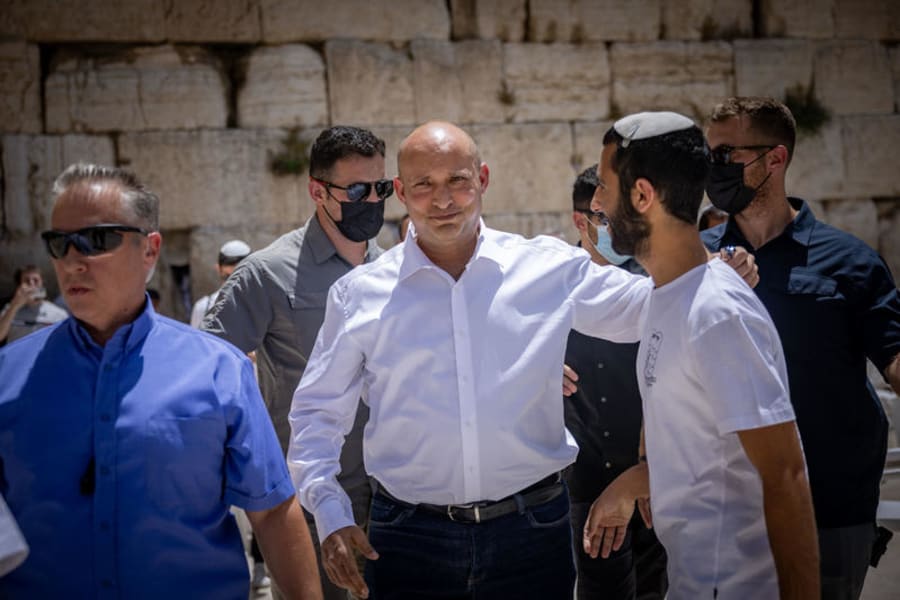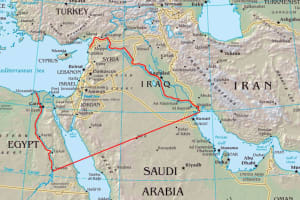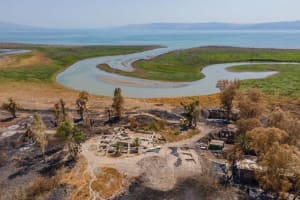Former Israel PM Bennett begins meeting with potential political allies while criticizing coalition ministers
Zionist opposition politicians increase efforts to lay the groundwork for a replacement coalition government

Former Prime Minister Naftali Bennett met with former Knesset member and reserve Lt. Gen. Gadi Eisenkot on Sunday, to discuss “actions to create a new and good leadership for Israel, which will unite the people, fortify security and rebuild the country.”
After recent polls have indicated that Bennett would enjoy high levels of support in potential elections, possibly even receiving the most votes, the former Netanyahu ally has been meeting with other Zionist politicians to discuss plans for a “change of government.”
Following the meeting on Sunday, a statement released by the two said they “discussed the war in Gaza and the urgency of returning the hostages, and the deterioration in the international situation of the State of Israel.”
The statement also said that "this meeting is a continuation of several meetings that the two have held in recent weeks and is part of the coordinated preparation plan for the change of government.”
Eisenkot recently split from political partner and head of the Blue and White party, Benny Gantz, over disagreements about internal voting in their joint National Unity party. Since leaving National Unity, and retiring from the Knesset, Eisenkot has been discussing a political alternative to the current coalition government and participating in a process of unifying Zionist parties to create a new coalition and hopefully achieve victory in upcoming elections.
Before the meeting with Eisenkot, Bennett had already met with right-wing opposition member Avigdor Liberman, another former Netanyahu ally, who resigned from his role as defense minister in 2018 after warning that Hamas was preparing for an invasion of Israel. Liberman said at the time that his warnings were not taken seriously.
A statement released after that meeting said that Bennett and Liberman had discussed "coordination and cooperation between the Zionist opposition parties, and the formulation of common principles for the Zionist bloc that will constitute a cohesive, responsible, and ethical alternative government that will lead Israel and replace the October 7 government.”
Liberman has spoken frequently about creating a new Zionist coalition as well as finally creating a constitution for the country, to place a clear legal framework for the government.
Among the principles Liberman has shared for the constitution are: equal defense burden by all citizens, capping the number of government ministers to prevent waste and corruption, term limits for the office of prime minister, preserving the existing Basic Laws, and automatically offering the formulation of the government to the party which wins the most votes.
Liberman and Eisenkot met last Thursday evening for a “strategic meeting” for building an alternative Zionist bloc to replace the current coalition government.
Sources close to Liberman told Hebrew news outlet Maariv that "it is important to have coordination and cooperation both on a technical and substantive level” ahead of elections.
“The public needs to know that there is a good, high-quality and cohesive governmental alternative,” the source said.
Meanwhile, Bennett’s frustration with the coalition government is becoming increasingly clear. In a series of recordings leaked to Hebrew media, comments that Bennett made during a meeting in Kfar Saba last week show the level of ire towards the current government.
“Today the government is made up of stupid ministers,” Bennett said at one point.
He said that ministers are only focused on pleasing their constituents, but give no thought to how their comments will effect Israel in the international arena.
“Simply stupid, I have no other word for it,” Bennett continued. “When a minister says, ‘We should drop a nuclear bomb on Gaza.’ Great, you said it — now you’ve gathered 17 votes — from lunatics. Will we drop a bomb on Gaza? No, but we’re the ones paying the price.”
Bennett was referencing a comment by Heritage Minster Amichay Eliyahu in November 2023, when he said that using nuclear weapons against Gaza was “an option.” That comment drew a rebuke from Prime Minister Benjamin Netanyahu, who called it “detached from reality.”
However, the statement was used by South Africa as part of its proof of intent in its genocide filing with the International Court of Justice.
Bennett said the ministers engaged in such behavior do not consider the cost to the IDF soldiers.
“It’s a sin to just call it stupidity,” Bennett noted. “It is worse. It’s evil, because they’re scraping together political votes here at the expense of our soldiers, some of whom won’t be able to travel abroad for the rest of their lives because of this madness.”
At the Kfar Saba meeting, Bennett also laid out some principles of a “Zionist unity government.”
“We need to form a national Zionist unity government based on the ‘alliance of service’: those who serve and who accept the government’s guiding principles,” he said.
Among the principles Bennett cited are some which Liberman shared: national service for all citizens, ratification of a constitution, judicial reforms (although not exactly the same as those pushed for by the coalition), term limits, and a state commission of inquiry into the events of Oct. 7.
While elections are not imminent, the departure of the Ashkenazi ultra-Orthodox party, United Torah Judaism, and the possible departure of Jewish Power, if Netanyahu agrees to a hostage-ceasefire deal, mean that a vote of no confidence could be called when the Knesset resumes following the fall holy days.
If the coalition government survives, elections are not scheduled until October 2026.

The All Israel News Staff is a team of journalists in Israel.
You might also like to read this:

















